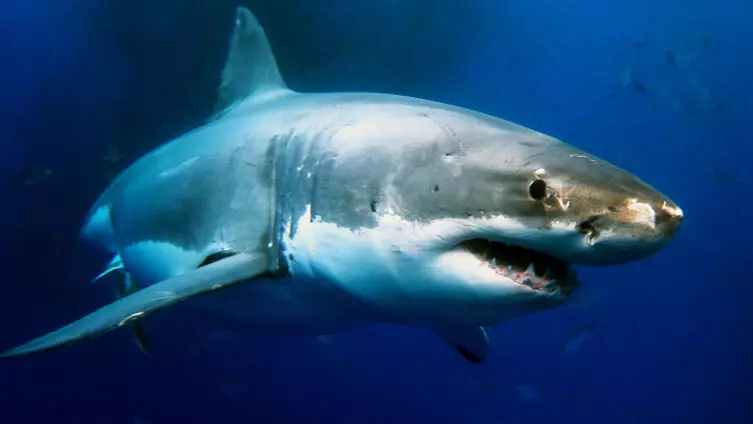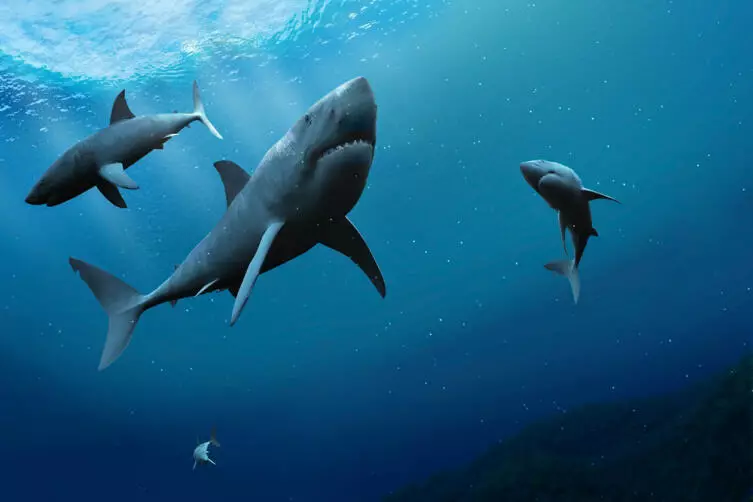
Biologists argue that in the oceans and seas of our planet there are almost 150,000 diverse inhabitants. And some of them occupy their, perfectly special, place in the underwater world.
Take, for example, all known sharks. Around them in many centuries, so much legends, taeks and stereotypes, that biologists, probably, were tired of being tired of refuting. However, even if you try to discard all the speculations about Shark, then these representatives of the sea depths will not be less mysterious.
For example, for a long time it was believed that sharks necessarily attack people who were in water in a dangerous place. However, it turned out that the shark could swim by the wounded diver to the wounded diver to cling to his powerful teeth at some rag that was nearby.
In terms of attacks on people, scientists found out one curious thing: shark can rush on a person, but only at a water temperature of at least 21 degrees above zero Celsius!
This was confirmed, in particular, the observations of Dr. Schulz. He studied in detail 790 cases of shark attack on people and found that only 3 attacks from these 790 happened in water with a temperature of 18 degrees above zero Celsius! That is, he followed the conclusion that sharks - the creation of thermal-loving.
Over the unbridled voraciousness of these predatory fish, all sorts of fantastic rumors went. They were debunk during thorough research. So, for example, it was possible to establish that the tiger shark for 1 year stay in the oceanarium ate only 86 kg of fish! This, I apologize, it seems like half of its own weight, and nothing more!
Yes, it can be argued here that the test tiger shark (most likely there were several of them) lived in greenhouse conditions, and it was not particularly wanted. But still! For a whole year - and only 86 kg of food!
It is precisely known that sharks have an extremely high sense of smell. Biologists took 1 gram of blood and dissolved it in 600,000 liters of water. So shark chuckled the smell of blood at a distance to a half-kilometer! This largely explains the rapid appearance of sharks on the place of shipwrecks with human victims.

But the vision of the shark is not so strong. It has been established that the formidable sea predators are pretty mining. In addition, they do not distinguish colors. But all this is true only for long distances.
The fact is that the visual apparatus at sharks is pretty peculiar. As it approaches to one or another, the shark object begins to rely more on his vision. This contributes to a special mirror-like layer in the mesh shell of the shark eye.
Experiments conducted with sharks gave interesting results. According to some scientists, the sensitivity of the eyes at the shark to the light after 8 hours of stay in full darkness increases almost a million times!
In addition to the above organs, sharks also have the so-called "lateral" line. This is a combination of nerve beams and thin hairs on the sides of the body. This lateral line serves as a kind of shark radar.

So see what it turns out: excellent smell, good vision and lateral line. Of course, with such a set in the marine element you will be one of the most destructive creatures. And add to this powerful sharks teeth!
Regarding the latter, no conventions did not have to come up. Shark really has a huge force.
It has been established that each tooth shark presses on the surface of the victim with a force of almost three tons!In addition, the upper teeth shark hang over the lower. And at first shark, as it were, puts the sacrifice on his lower teeth, and then the upper teeth at the expense of the head of the head as if she crashes what she fell into the mouth. It is not surprising that after these hellish manipulations, survive is very difficult.
However, there are cases when people died in the era of sailing vessels from rather minor wounds caused by sharks. For a long time, this fact embarrassed by observation people.

And only relatively recently it turned out that in the mouth of sharks there are always large quantities of bacteria causing a human infection in humans. But for the shark itself, these bacteria are safe.
However, it should not be assumed that the sharks are still some "ideal" marine inhabitants, the kind ocean "Terminators". There are terrible marine predators and weaknesses.
For example, shark is deprived of a swimming bubble. Therefore, it stands for a few moments to stop - and it will begin to rapidly fall on the bottom. So it turns out that shark has to be in motion all the time. And this, you see, not so simple.
In addition, shark is deprived of a special biological organism, pumping water through the gills. And it is necessary to pump water constantly, because it contains vital oxygen. This is the second reason why Sharley falls from birth to death to death in constant movement so that the aquatic streams pass through the gills.

So it turns out that in something, the nature was awarded the shark with an excess, and in something - very damaged.
However, sharks do not recognize about it at all, but live their restless, sometimes quite a long shark life ...
Author - Maxim Mishchenko
Source - Springzhizni.ru.
